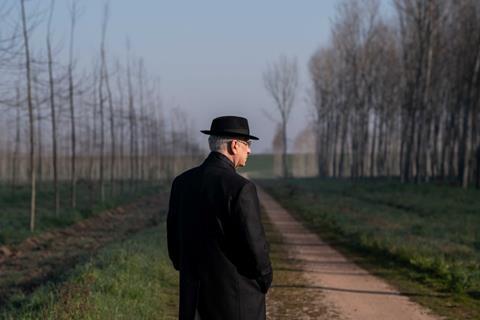The actor plays a fictional Italian president facing the end of his tenure in Sorrentino’s serious-minded follow-up to ‘Parthenope’

Dir/scr: Paolo Sorrentino. Italy. 2025. 131mins
Paolo Sorrentino can usually be relied on for stylistic and thematic fireworks so a new film from the idiosyncratic Italian auteur seems an obvious choice for a Venice opening night. But against expectations – especially following 2024’s lavish, even kitsch Parthenope – his latest offering is an austere, serious-minded affair, its tone set by a gravitas-laden lead by long-term Sorrentino star Toni Servillo as a fictional Italian president facing his final days in office.
Sorrentino tones things down while remaining recognisably himself
The latest of Sorrentino’s political stories, La Grazia contrasts starkly with his Il Divo and Loro, both starring Servillo; a spare fable about the inner conflicts of an Italian statesman, this time entirely imaginary, it shows Sorrentino dialling down his often unruly propensity for flashiness and aiming for a new maturity, more convincingly than not. Specific cultural references will see La Grazia registering more at home than abroad but, given Parthenope’s strong domestic box-office, Italian audiences will surely flock to its successor, different though it is.
While sluggish in its first half hour, La Grazia finds its footing once it fully establishes the enclosed world of an elderly Italian president Mariano De Santis (Servillo). The former judge is much respected, but recognised – by his entourage and indeed by himself – to be a bit of a dry stick. Nicknamed ‘Reinforced Concrete’, he is notorious for stolid circumspection, always taking his time to think issues through in accordance with the national constitution. With only a few more months in office, he has three important dossiers to ponder: a proposed bill on euthanasia and two applications to pardon convicted killers (the film’s title plays on the Italian word meaning both ‘pardon’ and ‘grace’).
Living in august seclusion amid the vastness of Rome’s Quirinale Palace, De Santis has a close advisor in lawyer daughter Dorotea (Anna Ferzetti), and a friend and counsellor in the Black, dreadlocked, moped-riding Pope (Rufin Doh Zeyenouin, wryly avuncular). A man with seemingly few pleasures in life – other than the music of real-life Italian rapper Guè, who has a cameo – De Santis is grieving for his beloved wife Aurora, who died eight years earlier, and is still tormented by her affair decades earlier with an unknown lover.
The film contains a handful of characteristic Sorrentino set pieces, not all of them successfully assimilated into the whole: the farcical slow-motion walk through wind and rain of a visiting premier feels like Sorrentino routinely flexing his stylistic muscle, albeit more glumly than usual. He’s more effective here when working in a lower key: the President’s failed video call with an astronaut in deep space, each man as isolated as the other, offers one of those genuinely affecting grace notes that Sorrentino can sometimes achieve.
La Grazia is low on Sorrentino’s usual grotesquerie, the nearest being a cheerfully over-the-top performance by Milvia Marigliano as a torrentially garrulous art critic; it’s also refreshing, especially after Parthenope, that Sorrentino takes a break from his determinedly old-school fixation with female beauty. And there’s a notable departure in two extended dialogues within prison walls – surely the first time that Sorrentino has explored the visual language of no-frills social realism. Overall, it’s a welcome change to see Sorrentino, who has often seemed as much a prisoner of his own style as Wes Anderson, toning things down while remaining recognisably himself.
The downside of his new visual restraint is that dialogue has to do more of the work, and La Grazia is sometimes cumbersomely talky in its ethical and existential musings. What gives the film its emotional continuity is a commandingly downbeat performance from Servillo, who has previously played real-life Prime Ministers for Sorrentino, both grotesque (Giulio Andreotti in Il Divo) and grotesquely flamboyant (Silvio Berlusconi in They). Here, he plays a different kind of dignitary, one who has merged with his official function almost to the point of himself being a void, yet an oddly sympathetic one.
Rich ensemble support includes Ferzetti as the doggedly supportive but increasingly rebellious Dorotea; Orlando Cinque as the President’s military majordomo; and Linda Messerklinger, steely and defiant as one of the prisoners in line for pardon. And returning DoP Daria D’Antonio brings fresh inflexions to a favourite Sorrentino image – grand Italian architecture dwarfing human presence with the monumental weight of history and power.
Production companies: The Apartment, Numero 10, PiperFilm
International sales: The Match Factory, info@matchfactory.de
Producers: Annamaria Morelli, Paolo Sorrentino, Andrea Scrosati, Massimiliano Orfei, Luisa Borella, Davide Novelli
Cinematography: Daria D’Antonio
Production design: Ludovica Ferrario
Editing: Cristiano Travaglioli
Main cast: Toni Servillo, Anna Ferzetti, Orlando Cinque, Massimo Venturiello























